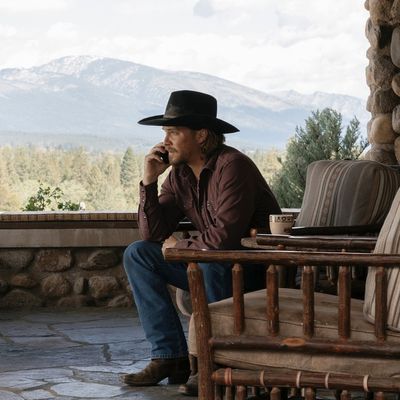
With the investigation into the John Dutton murder plot taking up most of the narrative real estate in this final half-season, the ranch hands and their stories have felt more disconnected and irrelevant than ever. But as the Duttons slowly lose their grip on the only home they’ve ever known and the old-timers are forced to reckon with the possibility of leaving, there’s a welcome melancholy in the air. I’m not exactly pulling for more scenes at the Four Sixes — last week, cutting the ranch hands entirely led to the best episode of the season — but it’s good to feel like the whole cast is integrated, all part of one story.
In “Counting Coup,” Rip and Travis get to work on selling the entire Yellowstone herd in a desperate attempt to maintain control of the ranch, while Lloyd contemplates other outfits he could work for. But the biggest moment of the whole episode belongs to Colby, of all people, probably the most endearing and least offensive ranch hand (as well as the one Black character for most of the show). He’s there to step in and save Carter when he gets kicked and cornered by a skittish stud in its stall. Carter manages to put the horse down, but not before Colby gets killed.
I probably should’ve known this was coming based on the manipulatively adorable opening scene of the episode, when Colby tells Teeter he loves her over the phone. But we’ve seen almost none of Colby these last four episodes outside a brief check-in with the remaining ranch hands early on, so it’s hard to know how to feel about it. I’ve always enjoyed the character, so I’m sad to see him go; honestly, I would’ve rather lost Ryan or Jake or even Carter, though we’ve only got two episodes left with this cast anyway. But I guess it’s a good thing to sacrifice a character with some degree of real emotional impact, and it’s affecting to watch Teeter and Ryan grieve. (The way Ian Bohen matter-of-factly delivers the line “Just lost my best friend, Jake” hits particularly hard.)
The story of Colby’s death isn’t really much about Colby, though the incident does illustrate his bravery and selflessness. It’s more an illustration of the risks of a life like this one, where “suffering’s the job,” in Teeter’s bitter words. And it’s also a vehicle for Carter, who’s understandably wracked with guilt in the long, somber aftermath. Beth is the one who provides the kid some comfort, telling him that he’s not to blame; after all, everyone is blaming themselves, including Rip and Lloyd, but the truth is that these types of things just happen sometimes on a ranch. Now is the time for him to turn to family for comfort — and as Beth reminds Carter, he has family here.
I’m glad this scene acknowledges the relationship between these two because season four put a lot of emphasis on their quasi mother-son bond (and how it played into Beth’s own trauma about having kids). But a lot of this story feels like it just exists to take up time and give the ranch hands something to do and feel besides general moroseness about the state of the ranch. It also suffers from its placement in the season: “Three Fifty-Three” really dialed up the drama when it came to the investigation into John’s murder and the war between the Dutton siblings, and this time that only really comes into focus in the first half (and very end) of the episode.
Those bits are fairly entertaining, though, especially when Detective Dillard puts the pressure on Jamie after Sarah’s death (which is being called a carjacking, even though it doesn’t resemble one at all). Jamie flounders like only Jamie can, insisting that his relationship with the late Sarah Atwood was strictly personal. But it’s a laughable idea; there’s plenty of evidence of their legal dealings, no matter how many pages he shreds. It’s all just way too fishy: The attorney general had a romantic relationship with outside counsel on the development project that his father shut down shortly before his murder. Jamie just barely manages to keep the detectives out of the bedroom, but his panic and transparent desperation only validate Dillard’s suspicions. (“You’re treating me like I’m a suspect.” “I wasn’t, but I will now.”)
The news of Sarah’s death confirms Kayce’s theory from the last episode that John’s killers would go after the person who paid them. Fortunately, Kayce’s old military buddy’s effort to track down the man in charge of the operation pays off pretty quickly. After the long Colby interlude, the episode returns to Kayce, who packs a bag for a night and sets out to confront Grant Horton.
Shortly following Grant’s daughter’s soccer game, Kayce slides into the backseat of their car and delivers his threats. Pointing a gun at a 9-year-old’s head conveys the message pretty efficiently: Kayce knows everything about this man and the people he loves, and he can kill them all if he ever chooses to. It’s rare to see Kayce in this mode these days; as he’s settled into the life of a family man, violence has entered his story less and less often, but this scene is a brutal reminder of how dangerous he can be.
By striking Grant in the head with his gun, Kayce is following a warrior tradition that originates with the Plains Indians: “counting coup,” which he explains to Grant and then mentions to Mo, his getaway driver. By only intimidating and lightly hurting the man who killed his father, Kayce has defeated his enemy without actually killing him. It’s an act of mercy, maybe, but also a power move. It’s hard to imagine Grant going after any of the Duttons again after that threat, besides maybe Jamie.
There are only two episodes left now, and only a few possible ways the story can go from here. Sometimes, all I can really hope for with this show is for something to happen — and luckily, there are things happening now, even if the urgency isn’t there like it once was. The major loss at the heart of this episode may have left me with mixed feelings, but at least I felt something.
The Last Roundup
• The Travis and Jimmy scene isn’t bad, I guess, but I can’t say I was super invested in Jimmy’s reaction to John’s death. They did have a bond in the early seasons, but we’re so removed from those times that it’s hard to feel the resonance here. Maybe Jimmy getting right back to work shows how much he’s matured since the early days — in this show, there’s nothing so noble and manly as burying your feelings and getting back to work — but we’ve spent multiple seasons now being told about Jimmy’s growth, so I really don’t need to see more.
• It does feel nostalgic to see the bunkhouse again in this episode, especially when Beth visits to pack up Colby’s few belongings to send to his mother.
• “When I find myself in the position of therapist, this family is pretty fucked.” Gotta love some self-awareness from Beth.
• I do understand some viewers’ frustration that Beth didn’t get to kill Sarah herself, but I still think it’s more surprising and interesting this way.
• Beth is now saying that arresting Jamie wouldn’t actually help them, because he’d reveal John’s secrets and ruin the Dutton legacy to save himself. But for someone who keeps insisting that she’ll “deal with it,” Beth doesn’t really seem to be dealing with it! I get that she can’t slit Jamie’s throat until the finale, but come on, do your Beth thing.
• Damn, this supposedly elite professional contract-killing company really isn’t very good at keeping anonymous at all, is it?
• Shout out to Denim Richards, who has been with the show since the very beginning. I wish he got a few more scenes to shine in these last episodes.


